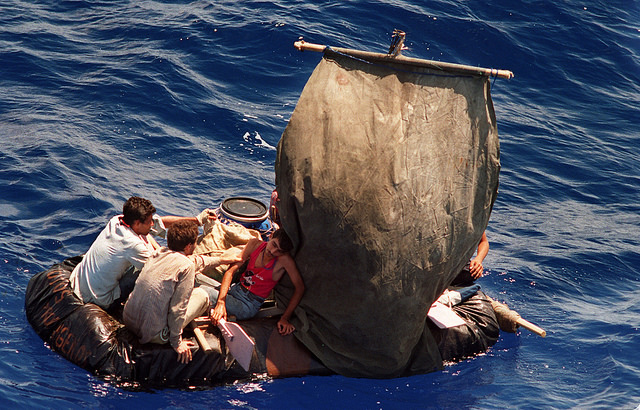Cuban “wet-foot, dry-foot” has been a point of contention among U.S. Latinos. U.S.-Cuban relations say No More.

By Victor Landa, NewsTaco
The big news this morning is foreign policy, and immigration policy, and not so much Trump. Although, the Trumpian border wall and the president-elect cabinet choices are in the mix.
The big headline, though, came from President Obama who yesterday ended the “wet-foot, dry-foot” policy regarding Cuban immigrants. The policy, in place since 1995, says that any Cuban immigrant who manages to put one foot on U.S. soil can stay and become a legal resident.
[pullquote]Cubans have been offered special considerations that other Latin American immigrants have not.[/pullquote]Before 1995 the standing policy was that rafts, or balsas, carrying Cuban immigrants intercepted in open sea would be brought to the U.S. where the immigrants, or balseros, would stay and become legal residents.
This has been a big point of contention among U.S. Latinos.
Until Thursday, Cubans have been offered special considerations that other Latin American immigrants have not. Cubans have never been required to “stand in line” like all other immigrants (at least not a 12 year line like the present wait for Latin American immigrants), neither have they lived the undocumented experience. The deeply felt but seldome voiced feeling was that Cuban immigrants enjoyed advantages that were not afforded to other immigrants.
Read more stories about Cuba and U.S.-Cuba relations in NewsTaco. >>
Cubans and Cuban-Americans pushed back on that idea, proclaiming that nothing was given to them and that if they thrived in the U.S. it was becasue of hard work and and striving for educaiton.
That’s true, but so is the special leg-up they received until yesterday.
That special status is over.
And although the change may seem abrupt, it’s been a part of talks between U.S. and Cuban authorities for several months. Ever since the diplomatic normalization process began the “wet-foot, dry-foot” policy has been on the list of things to be reviewed and negotiated.
On the Cuban side there has been a change as well.
In the past any Cuban who the U.S. returned to the island because they failed to put a foot on dry U.S. soil was placed in government custody. That has changed. Cuba will no longer detain returned balseros.
Do you like stories that reflect authentic latino life in the U.S.?
Be part of a positive change.
[Photo by Moody College of Communication/Flickr]

